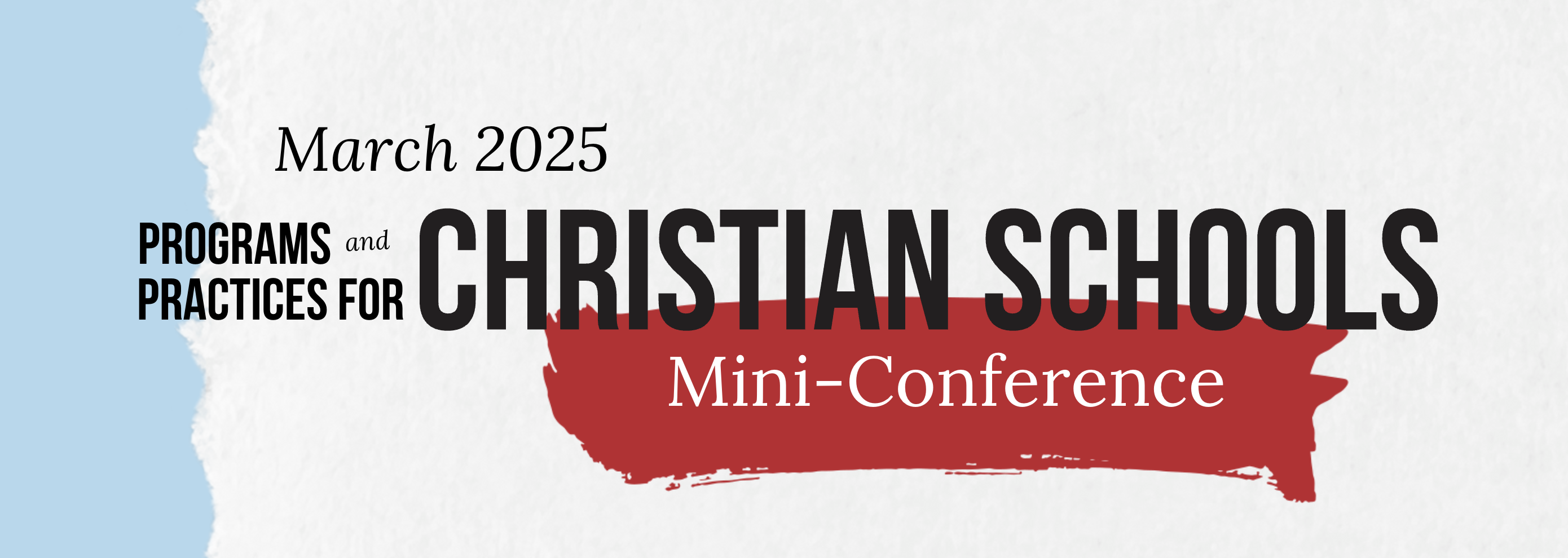|

<< Back to event page
Agenda Preview
 Full-Day Attendees Full-Day Attendees  Half-Day Attendees Half-Day Attendees  Family Partners Family Partners

 |
 |
|
8:30am Coffee and Fellowship
|
 |
 |
|
9:00am Welcome and Panel Discussion
Teachers, leaders, students, and parents from TAIS Christian schools will uncover the robustness of Christian education and ground attendees in the diversities and commonalities within. Co-facilitated by Dr. Bryan Williams, Head of School at Christ Methodist Day School, and St. Dominic School Dean Jefferson Brant.
|
|

|
|
|
9:40am Keynote - Be Bodacious: Making a Fresh Start to Move ForwardBy Scott Barron, Chief Reinvention Officer, School Growth and Co-Director, Educators Fellowship.
Nearly every aspect of educational strategies and structures is changing, and the need for continuous growth and adaptation among educators has never been more critical. But that doesn’t always come naturally to those who lead and serve in schools. So, let’s explore the powerful biblical principles of courage, humility, and wisdom and how these virtues empower educators to drive positive change in their personal lives and within their organizations.
Courageous educators are not afraid to challenge the status quo and learn new methods, and this session will provide actionable insights on cultivating and harnessing this vital mindset. We will consider how to overcome fear and resistance, embrace change, and take bold steps toward purposeful innovation.
|
| |
 |
|
9:40am Family Partnership Seminar - The Readied Child: Preparing Your Child for Success in the Classroom with Heidi Tringali, OT
As parents, we desire the best for our children. In today’s world, there are so many definitions of success that we can become overwhelmed or even immobilized by trying to find the best parenting tools and strategies. As a pediatric occupational therapist, Heidi walks the challenging journey of parenthood with families every day.
In this session, Heidi will help families clearly understand the difference between school readiness and learning readiness. With this understanding, attendees will identify developmentally appropriate goals for their young children and gain tools for supporting the meeting of those goals. In this, attendees will be equipped with three particular skills that will single-handedly enhance your child’s classroom performance. Families will leave this seminar confident in utilizing Heidi's tips and tools and, with consistency, can expect a calmer home environment, a classroom-ready child, and improved family dynamics.
|
 |
|
|
10:30am Break, Snack, and Networking
|
|

|
|
|
|
10:45am Breakout Session I
Path A: "Building Boys, Making Men:" A Holistic Approach to Character Education By Mark Fruitt and Palmer Albertine of Presbyterian Day School, MemphisGrades 1-6
For over 20 years, PDS's character education program, Building Boys Making Men, has played a vital role in the development of each boy and has been woven into every aspect of the school. The purpose of the program is to give the boys a vision and definition of manhood as well as to encourage them to make proper choices in their teenage years, strengthen father-son relationships, and strengthen school-parent relationships.
In order to give the boys a vision and definition of manhood, we recognized seven virtues that we feel will help each boy grow in his understanding of what it means to be a man. We are carefully intentional about each virtue, spending a month talking, discussing, teaching, and acting on just one.
From our chapels, class meetings, mentoring, Virtue Breakfasts, father-son events, Virtue Reality (community service), seminar classes, everyday teachable moments, parent meetings, and other events, we truly feel that “BBMM” is not just a program but it is who we are.
Path B: Mathematics, Physics, and Catholic Education By Sister Josemaria and Sister Nicholas Marie of St. Cecilia Academy, Nashville Grades 9-12
Discover Saint Cecilia Academy’s innovative Geometry and Physics First curriculum, which integrates a Catholic liberal arts tradition with STEM education. Within a structure that instills self-discipline and responsibility, St. Cecilia offers each student a learning experience that is both rigorous and flexible, designed to draw out her strengths and overcome her challenges. St. Cecilia's approach fosters girls' confidence in the pursuit of truth and beauty in both math and science.
Path C: Learning Is For Everyone (LIFE): A Christian Education Approach to Learning SupportBy Anissa Demonbreun, Autumn Ratliff, and Sierra Wenck of Nashville Christian SchoolGrades K-12
Learning Is For Everyone (LIFE) is an academic program at Nashville Christian School for students who struggle with college-preparatory pacing, skills, concepts, and curriculum or have other challenges that may impact their learning potential. Students with learning differences, such as reading, math, or written language learning disabilities, processing disorders, ADHD, or disorders on the spectrum can realize their intellectual, physical, spiritual, and social potential while attending an independent private school. The LIFE program gives our families an opportunity for their children who have a diagnosed learning difference to attend the same school as their traditional or honors track students and still receive a solid, private education. Come join us to hear how our programming works for students who need support and learn how you can take steps toward creating an inclusive learning environment at your school.
|
 |
|
|
11:45am-12:25pm Roundtables
Table One: Christian Institutions and the Common Good With Daniel Warner and Dr. John Grant of Evangelical Christian School, Memphis
This roundtable stems from two key convictions: (1) Institutions shape people toward specific ends through their structures and values, and (2) Christian institutions do not exist solely for themselves. To form students in accordance with the Way of Jesus, our institutions must attend to both inward and outward aims. Together, we’ll explore how our institutions can contribute to the common good through mission-aligned student formation, integration of faith and learning, and asset-based community partnerships.
Table Two: Early Childhood and Elementary Bible RoundtableWith Nell Womack and Rachel Groshart of Christ Methodist Day School, Memphis
Come and share ideas about how your school incorporates a biblical worldview into early childhood and elementary classrooms, chapel programs and special classes. We are excited to share lessons, curriculum ideas for children in 2K-6th grade.
Table Three: Discussing the Christian Understanding of the Human Person and AI By Sister Josemaria and Sister Nicholas Marie of St. Cecilia Academy, Nashville
|
|
|
|
|
12:25pm Lunch Lunch provided for full-day ticket holders only.
12:45-1:00 Afternoon-Only Ticket Holder Registration

|
 |
|
 |
1:10pm Breakout Session II
Path A: The Power of Your Story: Building a Culture of Connection By Julie Emory-Johnson, Ed.D. and Whitney Stovall, MS, NCC of Friendzy Grades K-12
Every story matters because every story is written by God. Anchored in Psalm 139, this session will explore how embracing the power of your story—and the stories of those around you—can transform your school culture. Through intentional leadership practices, storytelling, and reflection, we’ll outline a practical road map for cultivating Christ-centered communities marked by connection, compassion, and purpose. Together, we’ll examine how God’s vision for intentional relationships can shape thriving schools where students and staff feel seen, valued, and inspired. To support this journey, we’ll introduce Friendzy, a biblically-based program designed to help schools put these practices into action and create lasting impact. Leave equipped with tools, ideas, and inspiration to transform your school into a thriving community rooted in God’s love.
Path B: Truth and Identity in Pluralistic Spaces: Historical and Cultural Literacy
By Seth Johnson, St. George's Independent School, MemphisGrades 9-12
Culture matters. History, philosophy, art, literature, sports, mass/social media, etc. influence our "social imaginary," or the rules, norms, and stories that shape our perspective and our choices. How do we serve our students wisely as they navigate our fragmented, post-Christian culture? Even in a pluralistic setting, having an understanding and appreciation of the Bible is key, for it unlocks the ability to enjoy and participate in a millenia-spanning conversation. Our students have a passion for justice, but have they considered on what authority their conviction stands? When challenged with the notion that every truth claim is just a power grab, how can we teach that human rights, equal dignity of men and women, and defense and advocacy for the poor and vulnerable aren’t just relative values they blindly believe?
By tracing cultural influences back to their historical roots, we expose and assess competing presuppositions, allowing diverse worldviews to investigate their logical and historical consequences. This session will explore such topics, while discussing a 9th grade course designed around them with the Bible as a primary source text, and engaging with example course materials.
Path C: Learning Readiness: Maximizing Your Students' PerformanceBy Heidi Tringali, OTGrades PreK-6
Providing learning support is a combination of being an educator, detective, cheerleader, problem solver, and role model. As we strive to understand how a student learns, what learning strategies work best, and how hard to push/pull, our jobs can at times become overwhelming. Heidi provides a new lens to view our struggling learners that is easy to implement, will enhance your students’ performance, and enrich your already full educator’s toolbox.
The learning readiness lens acknowledges children are ready to learn when they are cognitively organized, physically calm, and socially connected. Heidi will explain the neurology behind learning readiness and discuss why children are matriculating into schools less ready to learn than ever before. You will leave this session with tips and strategies to help successfully integrate this lens into your repertoire of teaching tools.
|
 |
|
 |
2:10pm Breakout Session III
Path A: Faithful Stewardship: Advancing Mission Through GenerosityBy Buck Towner, Christ Methodist Day School, MemphisLeadership, Faculty, Development, Admissions, Marketing/ Communications
Fundraising in Christian schools isn’t just about meeting financial goals—it’s about advancing God’s mission through a culture of generosity. This session will explore how schools can engage parents, alumni, and donors in meaningful ways by connecting giving to their shared faith and values. Through real-world examples and practical strategies, we’ll discuss how storytelling, leadership, and trust can transform development efforts from transactional to transformational. Whether you’re leading an annual fund, a capital campaign, or simply trying to increase participation, this session will equip you with tools to inspire generosity and sustain your school’s mission for years to come.
Path B: The Power of Social Emotional Character Development: Teaching God’s Design for FriendshipBy Julie Emory-Johnson, Ed.D. and Whitney Stovall, MS, NCC of FriendzyGrades K-12
The good news is that boosting students' social and emotional skills is teachable, and God’s design for friendship provides the perfect foundation. Anchored in recent and compelling data about where students are today, this session will explore how teaching social-emotional skills from a biblical perspective can transform school culture and foster meaningful connections. We’ll dive into the power of using common language and consistent practices across students, teachers, and families to build a positive, Christ-centered learning environment.
Path C: Performance-Based Activities for the ClassroomBy Heidi Tringali, OTGrades PreK-6
Today, teachers in independent schools are tasked with providing a rigorous academic curriculum to students who sometimes lack basic classroom skills. As a continuation of the Learning Readiness session, this session offers easy-to-implement tools that develop learning readiness, social skills, group membership, and executive functioning skills while simultaneously teaching your school’s rich academic curriculum. Done correctly, this can occur without adding extra work to your teaching demand and without taking anything away from the existing curriculum.
Participants in this session will learn to plan, problem-solve, and design classroom strategies that will allow them to teach the current curriculum while developing:
learning readiness, social skills, group membership skills, executive functioning skills, visual motor skills, fine/gross motor skills, sensory-motor skills. This session is recommended in conjunction with the Learning Readiness session.
|
 |
|
 |
3:00pm Break and Snack
.
|
 |
|
 |
3:10pm Breakout Session IV
Path A, Closing Keynote: Distinguish Yourself with that Personal TouchBy Scott and Tammy BarronGeneral Audience
So much in our world is becoming impersonal. Kiosks, websites, and other digital interfaces replace human interaction in the name of efficiency. The ability to connect deeply with students, parents, and colleagues, however, is more important than ever.
When we develop and utilize a personal touch that goes beyond expectations, we create meaningful relationships within the school community and foster an environment where everyone feels valued and supported. By going beyond the curriculum and the handbook, we’re able to take the time to understand individual needs and aspirations. This enables us to unlock the potential in each person and inspire them to achieve their best.
We will explore how to integrate that personal touch into our teaching/leadership methods and communication style, creating an engaging learning environment that enables people to thrive.
Path B: Talking to Parents...When It's Not Academics By Heidi Tringali, OTGrades PreK-4
It is typically easier to lead parent conversations on a child’s academic issues, like math or reading, than behavioral or performance struggles. When we talk about a child’s behaviors, choices, social skills, physical abilities, sleep/diet, or the performance potential gap, oftentimes the conversation can become contentious or unproductive. In this session, Heidi will provide straightforward transparent techniques along with helpful tools to discuss non-academic performance issues with parents. You will leave this session confident in your ability to discuss all aspects of a child’s classroom abilities.
|
 |
|
 |
4:00pm Adjourn
|

<< Back to event page
|